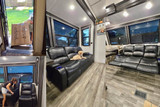Beef Up Your RV Hauling Rig: Maximizing Towing Capacity, Fuel Economy & Road Safety | RecPro
As an RV owner, you know that choosing the right truck to haul your recreational vehicle is a significant investment in and of itself. Often, the old pick 'em-up truck or hauling rig is overlooked when calculating the cost of a new trailer RV, and extensive hauling with an under-equipped platform will cause various components to wear out prematurely.
Even the stoutest of haulers (looking at you, Duallys, Diesels & HD trucks) will eventually fall victim to the effects of father time & regular wear and tear. Eventually, this will result in reduced towing capacity, fuel economy, and road manners. This process is hastened along by overtaxing the stock components, which may or may not be up to the task of supporting the weight of your trailer and cargo.
Determining if you are overtaxing your suspension and other components and subsequently upgrading your RV hauling rig can restore its capabilities, potentially even beyond its stock performance. In this post, we'll outline some key upgrades to consider when endeavoring to maximize your truck's towing capacity, fuel economy, and handling characteristics or "road manners."
Disclaimer:
If you are not already intimately familiar with the working of these systems and/or certified to work on them,
*It is strongly advised that you do not attempt to “DIY” these upgrades!*
These are mission-critical systems that can cause serious harm to you and others if they were to fail while in use on the road.
It is best to either sidestep this issue by purchasing an optioned hauling truck (meaning it comes from the manufacturer with beefier parts installed, which is quite expensive) or taking your existing rig to a professional mechanic and have them retrofit it to be better suited for heavy hauling.
Suspension Upgrades
One of the most significant performance upgrades you can make to your RV hauling truck is to augment its factory suspension system. A suspension system engineered to account for the load requirements of your RV and cargo will provide stability, improved handling, and a smoother ride, especially when towing a heavy trailer.
Consider upgrading to heavier-duty suspension components, such as upgraded leaf spring packs, add-a-leaf kits, overload springs, shocks & sway bars for you solid axle folks or upgraded coil-overs for the independent suspension crew. Depending on the age of your rig, there will be a few different parts that can be upgraded. Retaining the stock ride height is crucial for not overtaxing your steering components & ball joints.
Unless you want to spend a *significant* chunk of change correcting wayward steering geometry and replacing all those delicate, expensive steering parts... it's best to save the lift kits for your off-road toys. All they can do for you in this use case (heavy hauling) is wear your steering and suspension parts out faster.
Supplemental Airbag Suspension
Supplemental airbag suspension can greatly improve the stability and handling of your hauling rig while towing a heavy load. Airbags serve as additional shock absorbers and help distribute the load's weight evenly across the vehicle's suspension. This results in a smoother ride, reduced sway, and improved braking performance.
Airbags also help to prevent the vehicle from bottoming out or sagging when the RV is fully loaded, providing better ground clearance and increased safety on the road. As a result, supplemental airbag suspension is considered an essential component for RV owners who frequently tow heavy loads. These systems come in passive or on-the-fly adjustable versions. It is fairly easy to add a compressor to any passive setup as well.
 Brake Upgrades
Brake Upgrades
An additional upgrade to consider is enhancing your rig's braking system. Heavy loads place additional stress on your braking system, increasing the wear rate of consumables and reducing stopping power, increasing the risk of accidents.
Upgrading to larger or vented rotors, larger calipers, and ceramic brake pads can significantly increase your stopping power. If you are still rockin' drum brakes in the rear (or in the front, for that matter), it may be time to consider a weld-on or bolt-on disc brake upgrade. Drum brakes are prone to fade and failure, are comparably difficult to service, and provide much less stopping power than their younger cousins.
Getting a trailer brake controller wired into your truck can help to gain back a bit of braking performance & reduce stopping distance when hauling a heavy RV. Save the wear on your truck's brakes, and use the trailer brakes whenever possible. If your RV lacks trailer brakes, those would be another worthwhile upgrade to consider.
Tire Upgrades
The tires on your RV hauler play an outsized role in maintaining stability and traction, especially when towing a heavy load. Consider upgrading to heavy-duty tires designed for towing to ensure that your truck can safely handle the weight of your RV and its payload. Aging or balding tires will have a pronounced negative impact on your handling capabilities, and will have trouble dealing with any amount of moisture on the roads. Be sure to account for the weather and terrain you intend to drive in when selecting new tires.
Hitch Upgrades
Finally, upgrading your truck's hitch is the last step we will mention in maximizing your rig's towing capacity and safety. A heavy-duty hitch with a more robust weight capacity will ensure that your rig can safely tow your desired load, reducing the risk of hitch failure and accidents.
Take your truck to the mechanic to weld this addition to the frame; they will size your receiver according to your load requirements. In the same vein, stabilizer bars are another upgrade that can (you guessed it) add stability to your trailer.
Consult a Professional Mechanic
Before making any upgrades to your RV hauling rig, opening a line of communication with a certified mechanic or garage is a good idea. An experienced professional will help determine which upgrades are necessary for your truck to be more capable in its use case. They will also ensure that the enhancements are correctly installed and meet the manufacturer's specifications. It's nice to be able to rely on warrantied work and not be on the hook for any problems that may arise after your modifications have been installed.
In summation, upgrading your RV hauling truck can carry some significant advantages. Enhancing stock suspension, brakes, tires, and hitches can help maximize towing capacity and road safety. All of these factors can reduce the risk of accidents and help to ensure a smooth and enjoyable trip. Don't wait until something critical fails – consider proactively upgrading your RV hauling rig to make for a more comfortable & economical travel experience.
Which upgrades have made the most difference on your towing rig? Let us know down in the comments!
Recent Posts
-
Traveling to the RV Hall of Fame in Elkhart, IN
If you are traveling to Elkhart, IN to see the RV Hall of Fame, getting off the toll road at exit 96 …Nov 14, 2025 -
Best RV Air Conditioners of 2025: An Expert Guide From RecPro
Quick Answers Best overall RV air conditioner: RecPro 15K Quiet AC with Heat Pump (RP-AC3800) Best f …Oct 29, 2025 -
The Nuclear Nomads Expand Sofa with New Recliner Section Install
The Nuclear Nomads are a full time RV family living in south Florida. Andi and Joey value quality ti …Oct 24, 2025 -
Trailer Wiring Guide: How to Wire Your Trailer for Safety and Efficiency
Table of Contents 1. Common Types of Trailer Connectors 2. Trailer Wiring Diagrams: Color Codes and …Aug 20, 2024 -
How to Keep Your Pets Safe While Camping
RVing and camping are a great getaway from the hustle and bustle of work and the city and the day-to …Jul 02, 2024 -
Why Replace Your RV Furniture?
You may wonder when is the best time to replace your RV furniture. There is no one right answer to t …May 20, 2024







